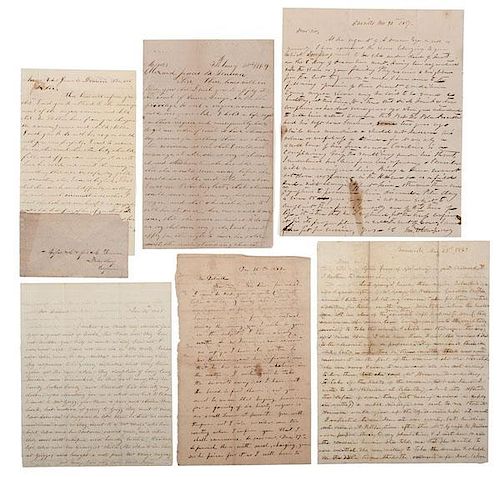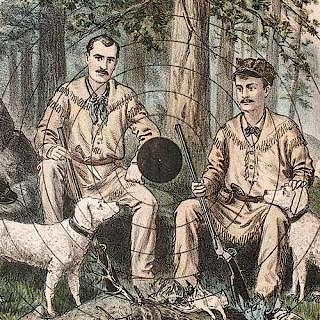Petersburg, Virginia, Law Firm of Alexander & James Donnan Archive Concerning Slavery & Confederate Issues
About Seller
6270 Este Ave.
Cincinnati , OH 45232
United States
With offices in Cincinnati, Cleveland and Denver, Cowan’s holds over 40 auctions each year, with annual sales exceeding $16M. We reach buyers around the globe, and take pride in our reputation for integrity, customer service and great results. A full-service house, Cowan’s Auctions specializes in Am...Read more
Two ways to bid:
- Leave a max absentee bid and the platform will bid on your behalf up to your maximum bid during the live auction.
- Bid live during the auction and your bids will be submitted real-time to the auctioneer.
Bid Increments
| Price | Bid Increment |
|---|---|
| $0 | $25 |
| $500 | $50 |
| $1,000 | $100 |
| $2,000 | $250 |
| $5,000 | $500 |
| $10,000 | $1,000 |
| $20,000 | $2,500 |
| $50,000 | $5,000 |
| $100,000 | $10,000 |
About Auction
Nov 20, 2015 - Nov 21, 2015
Cowan's Auctions dawnie@cowans.com
- Lot Description
Petersburg, Virginia, Law Firm of Alexander & James Donnan Archive Concerning Slavery & Confederate Issues
A rare, intact archive of 65+ items from the Virginia law firm of Alexander and James Donnan, ca 1818-1876.
Slavery through the 1640s and 1860s was governed by a body of law. Every slave state followed a set of legal codes that made slavery a permanent condition, inherited by the mother, and designated slaves as property. As a result, slaves could not own property or be a party to a contract. Contracts became the responsibility of owners. Lawyers Alexander and James Monroe Donnan represented many Virginians whose assets were neither land nor livestock; they were human beings. Their humanity created complicated legal dilemmas for the Donnan's clients. This collection of documents comprises an intact archive of approx. 65 papers from their Petersburg, Virginia law firm. More than 40 of the items directly concern slavery & CSA Civil War issues because the Donnans were very active in handling various aspects of their clients' ownership of slave property.
Legal issues made some owners view their "property" as a burden. In a letter dated January 14, 1861, Mr. M Durell wrote, I reckon you think my servants give you a great deal of trouble, but I am sure they have not troubled you half as much as they have troubled me, I sometimes wish I did not own one in the world. Durell sought council for complaints voiced by his recently sold slaves, Celci and Randall, against their current owner, Mr. Gregg. Durell was not certain if he could incur the expense of the slaves and their four children. He realized that if he sent the slaves back it would be a trouble all the year, but he hate[d] to put the children where they are not properly treated... Durell transferred the entire family to Sylvia Turner, but the predicament continued for at least three years. In 1864, Turner wrote to Durell, I wish you to take the servants away, as I have not the bread to feed them, and you must be aware that buying provisions for a family of six hearty negros is no small item at present. You will therefore not I hope consider me too exacting when I inform you that I shall commence tomorrow Dec 27th to furnish them with a meal, charging you such price for it as I will have to pay... There is no indication of the final outcome of the case; however, the letters demonstrate relationships between slaves and their owners and reveal some complications that arose when "property" complained of their working conditions and refused to work.
Bold slaves negotiated their sale by manipulating their circumstances. In one particular case, an "obstinate" female slave induced her and her two-year old's sale by speaking against her owner. Her owner Lucilla Harrison wrote, My reason for selling them are these...she is very high tempered...she has told me when I was in Petersburg last that she never would serve me nor my children any longer and that she wished me to sell her at once, her own words to me were, that she never intended to do me nor any my children any good....I think I have said enough on the subject and hope that my request will be complied with.
Even though some slaves gained slight command over their poor situation, power ultimately belonged to the owner. Slave owners could sell their property at almost any moment. The Donnans’ client, E. Donnan requested to sell his slave, Harry because he is too independent for me to manage and besides he drinks so hard, that it keeps him continually sick and I have to pay doctors bills. The expense of his care and his lack of work outweighed his value. E. Donnan most likely sold Harry at a “reduced price” as a result of his alcoholism.
Slaves were also at the mercy of the courts when their owner died. Like furniture in a house, surviving family members parceled out the deceased’s slaves. When J.M.D. Anderson passed the executor of his will, Mary J. Wells created a chilling roster of his slaves' new households. Scrawled in the margins Wells wrote, I will take E. next spring. Mrs. Morgan will take care of her until then. Mrs. Morgan will keep [Fanny, Ella, and Stephan] at home. These [Ella and Stephan] are small children. I wish Mary Ann and William to be hired out. I will take Margret home.
The conclusion of the war, however, ended slave owners’ dominion. On February 11, 1867 Vincent Cousin, an African American man, purchased 100 acres of land from David R. Stokes. The remarkable accomplishment exemplifies the new freedoms experienced by some African Americans after the war.
Additional papers in the lot include various bills of sale for a variety of goods, land deeds, a pardon for a wrongfully imprisoned person, claims to damages incurred while Confederate troops occupied the city, and a volume of Four Years in the Governor's Mansion of Virginia-1910-1914 by Etta Donnan Mann, the daughter of Alexander Donnan.
For a detailed look at the contents of the archive, go to: http://www.historybroker.com/collection/donnan/index.htm .Letters and legal documents range in condition. All have typical folds and most are very legible. Some have minor tears on the folds and fading of the ink.Condition
- Shipping Info
-
SHIPPING. At the request of the buyer, Cowan's will authorize the shipment of purchased items. Shipments usually occur within two weeks after payment has been received. Shipment is generally made via UPS Ground service. Unless buyer gives special instructions, the shipping method shall be at the sole discretion of Cowan's Auctions, Inc.. Cowan's is in no way responsible for the acts or omissions of independent handlers, packers or shippers of purchased items or for any loss, damage or delay from the packing or shipping of any property.
-
- Buyer's Premium



 EUR
EUR CAD
CAD AUD
AUD GBP
GBP MXN
MXN HKD
HKD CNY
CNY MYR
MYR SEK
SEK SGD
SGD CHF
CHF THB
THB













